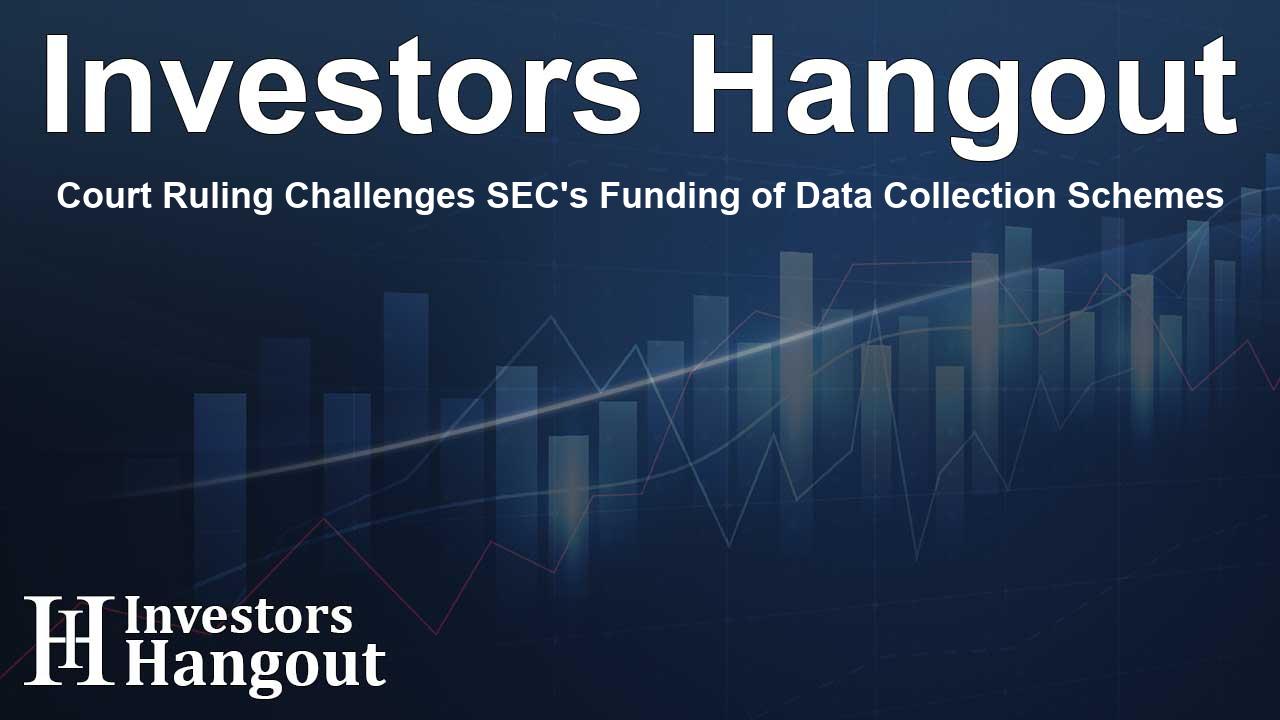Court Ruling Challenges SEC's Funding of Data Collection Schemes

Eleventh Circuit's Groundbreaking Ruling Against SEC
The Eleventh Circuit Court of Appeals has put a spotlight on the actions of the SEC by delivering a significant ruling, which stands as a victory for American investors. This ruling vacates an order issued in 2023 that mandated broker-dealers within the financial industry to fund the SEC's controversial "Consolidated Audit Trail" (CAT), a project that many critics argue lacked proper congressional authorization.
The Nature of the SEC's Funding Order
The CAT was designed to facilitate detailed tracking of U.S. market trades, which critics believe represents an overreach of governmental surveillance. The New Civil Liberties Alliance (NCLA) played a pivotal role in this case, submitting an amicus curiae brief that highlighted the ramifications of the SEC's funding order on investors. They argued that this order shifts costs onto the American public, effectively functioning as an unlegislated tax.
A Closer Look at the CAT Program
Under the current structure, the CAT requires brokers, market exchanges, and alternative trading systems to gather and submit comprehensive data on each investor's transactions to a massive centralized database. This repository is not just accessible to the SEC; it extends to self-regulating organizations and contractors indefinitely. According to NCLA, the CAT isn’t just any database but stands out as the largest securities database globally, raising profound concerns about privacy and the scale of government oversight.
Constitutional Concerns Raised
The United States Congress did not sanction the establishment of this surveillance system, nor has it provided funding for its creation. Critics now argue that the SEC's actions violate the Fourth and Fifth Amendment rights of American citizens. By accumulating detailed financial records from all individuals without sufficient legal justification, the CAT risks unchecked government surveillance capabilities.
Impact on Investor Rights
Investors' rights are also under threat, as the CAT program has been criticized for infringing upon First Amendment rights. The program's data collection methods delve into individuals' private investment strategies, effectively sharing their decisions with governmental agencies, which raises ethical and legal issues.
Funding Mechanisms and Their Implications
To finance the CAT, the SEC has taken billions from self-regulatory organizations like the Financial Industry Regulatory Authority (FINRA). This self-appropriation method has been deemed unconstitutional because it bypasses the legislative process, an essential aspect of taxation. Stakeholders worry that these costs ultimately trickle down to individual investors, constituting a hidden tax that could amount to billions.
Next Steps and Future Proceedings
The Eleventh Circuit's recent ruling did not directly address the legality of the CAT itself. However, NCLA is keen to continue advocating against the program in forthcoming court challenges. They believe that further legal scrutiny will reveal the fundamental flaws in the program and its implications on investor privacy and rights.
Statements from NCLA Leadership
Leadership at NCLA has expressed hope and determination following the Eleventh Circuit's decision. Senior Litigation Counsel Peggy Little stated that Congressional approval is crucial for any such invasive program, emphasizing that the people affected the most are innocent American investors. Furthermore, Mark Chenoweth, President of NCLA, reaffirmed their commitment to seeing the judicial system recognize the unconstitutionality of the CAT database.
Conclusion
The implications of this ruling are far-reaching and could lead to fundamental changes in how financial surveillance is handled in the United States. For organizations like NCLA, this decision serves as a platform to enhance advocacy for protecting citizens' constitutional rights against overreaching government interventions.
Frequently Asked Questions
What was the Eleventh Circuit's ruling about?
The Eleventh Circuit ruled against the SEC's order that required broker-dealers to fund the CAT program, finding it arbitrary and capricious.
Why is the CAT program controversial?
The CAT program is contested due to its extensive data collection on all investors without sufficient legislative backing and the potential infringement on constitutional rights.
What are the constitutional concerns raised?
Critics argue that the CAT program violates the Fourth and Fifth Amendment rights by enabling warrantless searches of financial records, infringing on citizens' rights to privacy.
How will this ruling affect American investors?
The ruling may help mitigate unauthorized costs passed onto investors, potentially preventing a multi-billion-dollar hidden tax.
What is NCLA's position on government surveillance?
NCLA advocates for protecting individual rights and preventing excessive government surveillance that infringes on constitutional freedoms.
About The Author
Contact Henry Turner privately here. Or send an email with ATTN: Henry Turner as the subject to contact@investorshangout.com.
About Investors Hangout
Investors Hangout is a leading online stock forum for financial discussion and learning, offering a wide range of free tools and resources. It draws in traders of all levels, who exchange market knowledge, investigate trading tactics, and keep an eye on industry developments in real time. Featuring financial articles, stock message boards, quotes, charts, company profiles, and live news updates. Through cooperative learning and a wealth of informational resources, it helps users from novices creating their first portfolios to experts honing their techniques. Join Investors Hangout today: https://investorshangout.com/
The content of this article is based on factual, publicly available information and does not represent legal, financial, or investment advice. Investors Hangout does not offer financial advice, and the author is not a licensed financial advisor. Consult a qualified advisor before making any financial or investment decisions based on this article. This article should not be considered advice to purchase, sell, or hold any securities or other investments. If any of the material provided here is inaccurate, please contact us for corrections.
